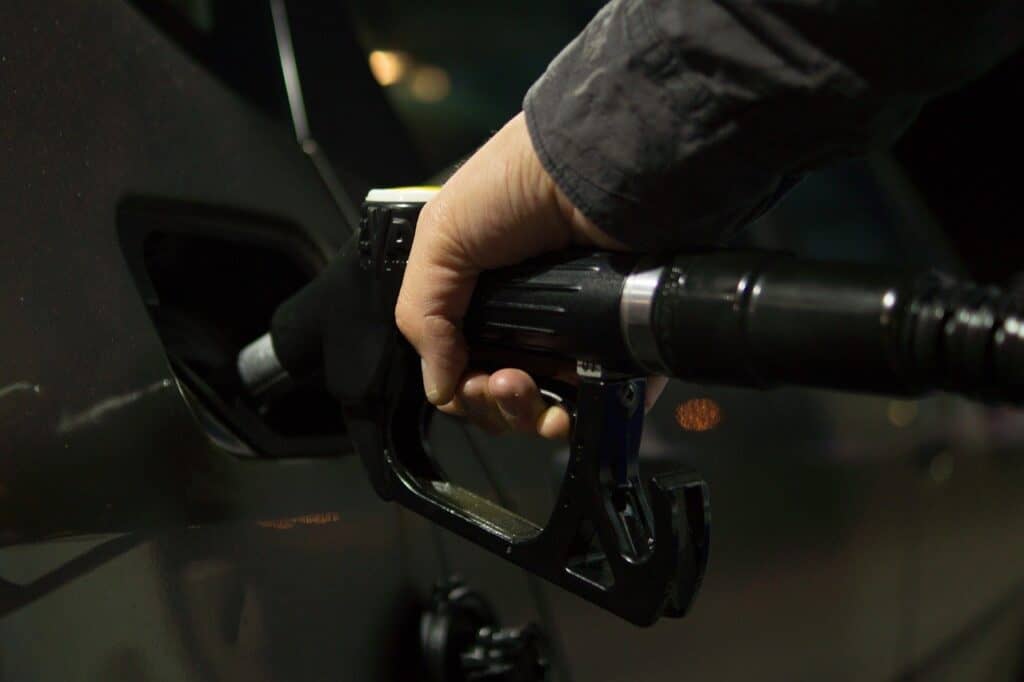Olive oil is the taste of the Mediterranean and it is superb in many kinds of foods. It is a brilliant accompaniment to bread (especially with a hint of Balsamic vinegar), you can drizzle it on a salad or make a dressing with it and you can even roast potatoes in it. But does olive oil represent a significant fire risk, and should we be more careful about how we store olive oil in our kitchen?
Olive oil can catch fire, but it is not classified as flammable. Olive oil can burn more easily if you heat it up and then spray it in a fine mist. This changes the amount of surface area available to heat and it’s easier for the olive oil to reach its smoke point/flash point and burn.
Let’s take a look at the properties of olive oil and what they mean from a fire safety perspective.
Your # 1 priority is keeping your family safe. As a firefighter, I recommend everyone has updated smoke detectors that don’t require battery changes, like these ones from Kidde, a fire extinguisher, like this one from Amerex, and a fire escape ladder if you have bedrooms above the first floor, I recommend this one from Hausse.
Also read: What Makes Something Flammable?
What Is Olive Oil?

Olive oil is a form of cooking oil. It’s made by pressing olives, which are the fruit of olive trees that are traditionally grown in the Mediterranean. Olives are grown in Spain, Morocco, Turkey, Greece, Italy, Jordan, Lebanon, and many other places.
It is used in traditional Greek cooking, as well as Spanish and Italian, and has been adopted by many other cooking schools too.
The makeup of olive oil, from a chemical perspective, is mainly oleic acid (that is a fatty acid) and a blend of other fatty acids, and a trace amount of flavor chemicals.
If you want Extra Virgin Olive Oil, which is the highest grade of olive oil, then it must have no more than 0.8% free acidity and it must also have an exceptional flavor profile.
It appears to have first been used around the 7th century BC and at, one point, it wasn’t just used for cooking – it was also used for birth control! Aristotle himself recommended applying it liberally along with some cedar oil to keep the babies away.
It has also been used in some Orthodox Churches for baptismal oil and it has been consecrated for use in other holy rituals too.
Some natural skin treatments also make use of the fatty properties of olive oil, though researchers don’t recommend this and they say it might worse atopic dermatitis.
Also read: Are All Oils Flammable? [Cooking, Motor, Mineral, Essential]
Can Olive Oil Catch Fire?
Like all cooking oils, olive oil can catch fire and when it does, thanks to the hydrocarbon chains in the molecules of the oil, it burns in a self-sustaining manner.
This is why many old churches and civilizations used olive oil as a lamp fuel and in fact, in the Eastern Orthodox Church, olive oil remains a popular choice for fuel for lamps in the church, at home in prayer corners as well as in cemeteries.
However, it’s worth noting that olive oil is not “flammable” per se. This is due to its high flashpoint temperature as defined by OSHA.
You can see in this video that olive oil can definitely catch fire:
Also read: Is Vegetable Oil Flammable? Technically No…
At What Temperature Does It Catch Fire? FlashPoint
The flashpoint temperature of olive oil is 410 degrees Fahrenheit (210 Celsius) and that’s quite high in most circumstances.
That doesn’t mean, however, that you can’t encounter both that temperature and an open flame in a working kitchen.
You can and if you do, olive oil will burn and the fire is self-sustaining, if you intend to extinguish the blaze – you should use the standard protocols for any cooking oil fire (Class K).
Note: If you decide to use olive oil in a spray bottle to turn it into a fine mist – you will make the olive oil much more flammable. Fine particles have a lot of surface area exposed to oxygen and thus, they require lower temperatures to burn at. Be careful with this.
Also read: Can Essential Oils Catch Fire? Are They Flammable?
What About Extra Virgin Olive Oil?
No, but extra virgin olive oil is more flammable than ordinary olive oil and may have a flashpoint temperature of as little as 325 degrees Fahrenheit. But it still doesn’t fit OSHA criteria to be a flammable liquid.
That means you should be just a little more cautious about using extra virgin olive oil around a naked flame.
Also read: Is Honey Flammable? Will it Catch Fire?
Why Did My Oil Catch Fire While Cooking?
If you are using olive oil in cooking and it exceeds the flashpoint, it will start to smoke, in fact, with oils we normally talk about the “smoke point” rather than the flashpoint because of this.
This means that the olive oil is burning. It may be that the pan or cooking vessel that you are using is too hot and you need to adjust the heat appropriately.
This is why different cooking oils are better for each application, as they have different smoke points. Make sure to choose the right oil for the temperature range you will be using to cook.
This video talks about using olive oil for high heat cooking and why you may not want to:
If the oil is on fire in a serious manner, you will need to tackle the fire as with any other cooking oil fire.
Also read: Is Grease Flammable? It Depends…
Can It Spontaneously Combust?
No, with a high flashpoint, there are no circumstances under which olive oil is going to get hot enough to spontaneously combust when stored in a kitchen.
Olive oil has an auto-ignition temperature of 435 degrees Celsius (815 Fahrenheit). This is a high enough temperature that the risk is very low for spontaneous combustion of olive oil.
You need a source of heat and flame to get olive oil to catch fire and that means as long as you use common sense, it’s safe to keep in your kitchen.
Also read: Is Mineral Oil Flammable? Yes and No…
Is It Flammable In The Oven?
It depends on how much olive oil that you use and how hot your oven gets. The more oil you have present when the temperature goes above the smoke point – the more likely a fire becomes.
Strictly speaking, olive oil is not a flammable liquid, but we suspect that, if it catches fire in your oven, that won’t be much consolation.
Related Articles
Is Vinegar Flammable? Can it Catch Fire?

